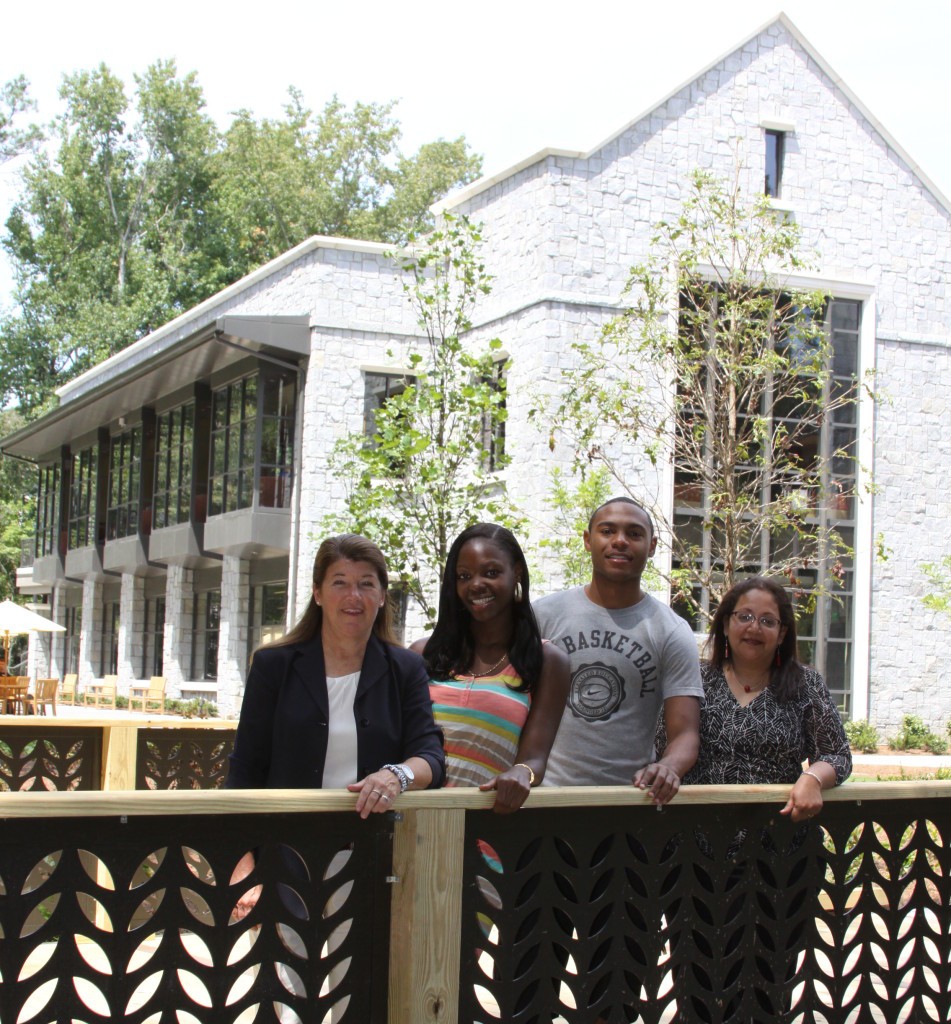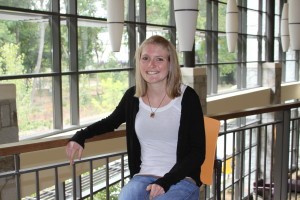Tirzah Brown ’14 is passionate about raising awareness of sexual trafficking and has worked with nonprofits for several years that combat this issue, traveling as far away as the country of Moldova to volunteer.
Scott Kenney ’14 has volunteered in soup kitchens since he was old enough to hold a spoon.
Delaney Bush ’15, the daughter of school administrators, grew up in the culture of independent school systems and dreams of someday opening her own private school. But these students want to do more to support their respective causes. Now, thanks to Oglethorpe’s new nonprofit management minor, they are learning the business of the nonprofit sector and gaining valuable volunteer experience, all while getting an education that will help them become the agents of change they envision themselves to be.

Dr. Lynn Guhde, Khoyisha Stoutt 15, Aaron Del Rosario 14, and Dr. Seema Shrikhande are among the faculty and students active in LAB Bridge, an on-campus nonprofit inspired by the nonprofit management minor.
Expanding Our Reach
The nonprofit management minor joined Oglethorpe’s curriculum in fall 2011 as part of an effort to combine the academic and community service components of Oglethorpe’s education and to provide a stepping stone for students interested in pursuing a career in this field. Professors Ron Bobroff, Lynn Guhde, Peter Kower and Alan Loehle helped to launch the program.
The first step was to reach out to the local nonprofit community. “I met with a collection of leaders in the nonprofit industry and asked them which skills they think future nonprofit leaders need to have,” said Dr. Guhde, associate professor of business administration and chair of the Division of Economics and Business Administration. “We took their input and used it to help create the program’s curriculum.”
The minor includes a series of five courses that provides a basic foundation about nonprofits with focused instruction in finance and communications, an elective relating to the student’s major, a “capstone” course, and required volunteer hours.
“We take people who have the interest and the energy and the passion to work in the nonprofit field,” Dr. Guhde says, “and we give them the business skills they need in order to make that happen. It’s the perfect role for us to play at Oglethorpe, a liberal arts institution.”
Academics In Action
During their enrollment in the program, students must complete 100 volunteer hours with a nonprofit of their choice. They are encouraged to choose an organization in a field that relates to their major to more easily apply their entire Oglethorpe education on the job. Students in the minor come from a wide range of majors, including accounting, history, theatre and biology. As a result, their volunteer locations are eclectic as well. More than 20 nonprofits in metro Atlanta have already benefited, including Piedmont Park Conservancy, Operation HOPE, American Lung Association, Atlanta Contemporary Art Center and the office of Atlanta Mayor Kasim Reed.

As part of her nonprofit management minor, Tirzah Brown ’14 volunteers with organizations that combat human trafficking. Oglethorpe was her first choice because it allowed her to mold her education to fit her career interest: fighting human trafficking – while located in Atlanta, a city known as a U.S. hub for the crime. She serves on a committee and brought The NO Project’s Judy Boyle, a national leader on the subject, to campus in October 2013.
Delaney, who is pursuing an independently planned major in business and education, says that her decision to attend Oglethorpe hinged on the nonprofit management minor. “It fuses my interests in business and education, since private schools are nonprofit organizations.” She has completed most of her volunteering in three private schools and plans to work at others to broaden her exposure to the business of running a school. Tirzah, a sociology major, completed much of her required volunteering working with Wellspring Living, a nonprofit that battles childhood sexual abuse and exploitation through awareness, training and treatment programs for women and girls. Tirzah served as an academic mentor to girls who are survivors of sexual slavery. After earning the trust of the nonprofit’s staff, she was given permission to travel to a secret location in Atlanta to help these girls focus on returning to school or earning their GED. “I was first introduced to the horrors of sexual slavery when I was a teenager and all I could do at that point was help to raise awareness,” said Tirzah. “I’m happy that I am now able to do more to really help these girls transition to a more normal life.”
An accounting major, Scott also demonstrated to his supervisors that he could be trusted. Scott assisted with financial accounting at the Church of St. Vincent DePaul and was able to see how nonprofits must hold themselves accountable. “They record everything down to the minute, like how much time they spend with a person, or the amount of supplies and resources they give to each person. They have to take their records down to the penny to be effective in getting people help.”
A Nonprofit Incubator
The minor’s “capstone” project, originally conceived as an opportunity for students to consult pro bono for local nonprofit organizations, was “re-imagined” in spring 2013 due to unexpected, but welcome, circumstances. Inspired by students’ enthusiasm, adjunct accounting professor Henry Zigtema decided to make a donation to benefit the program. A former partner with Ernst & Young and experienced in the nonprofit sector, Zigtema felt that students would best learn about running a nonprofit by doing just that. “I wanted to allow students to get experience actually operating a fund with real money.”
Now with funding, a team of five students and three faculty members (Dr. Guhde, Dr. Seema Shrikhande and Tory Vornholt) began the process of creating a student-run nonprofit on campus: LAB Bridge, derived from the students’ goal to bridge the gap between the liberal arts and business worlds, according to newly-elected CEO Shani Henry ’13. “We saw that students were becoming more interested in the nonprofit industry, but weren’t aware of the resources available to them, and we want LAB Bridge to support them in their endeavors.”
Alumnus and attorney Cleve Hill ’01 provided pro bono legal consulting to the team. He worked with Dr. Guhde to finalize LAB Bridge’s articles of incorporation and other organizational documents. “I think it speaks to the character and the goals of the university, not just for us to offer the program, but to have students who are interested in getting their hands dirty and learning how the process works,” said Hill.
This fall, the LAB Bridge team hopes to receive their 501(c) designation and to finalize the nonprofit’s programming. “So many people have altruistic intentions and great energy, but get tripped up by the details,” said Zigtema. “Hopefully LAB Bridge will allow students to make mistakes and learn from them in a controlled environment. That way when they actually get out in the real world and start realizing their dream of operating a nonprofit, they will be able to do it well.”
Future Leaders
This past summer, Delaney landed a paid internship position in the Human Resources Department at The Coca-Cola Company. “I don’t believe I would have gotten this opportunity to work with Coca-Cola if it wasn’t for the nonprofit minor,” said Delaney. “Because of what I learned in the program, I was able to articulate how my education background could fit in at the The Coca-Cola Company.”
Scott has also gained an important lesson. “The work these organizations are doing is all about the people,” he said. “No one is involved for the money, but everyone is involved to do something positive.”
And for Dr. Guhde, that extends to her students. “It is really inspiring to see that spark in a student and know that they will really make a difference some day.”
